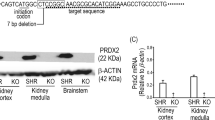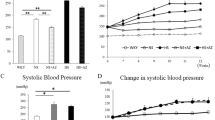Abstract
Previous studies have shown that short-term high salt intake unmasks blunted plasma aldosterone suppression in stroke-prone spontaneously hypertensive rats (SHRsp). The aim of this study was to evaluate the response of aldosterone biosynthesis and production to a sustained exposure to the stroke-permissive Japanese-style diet (JD) in young stroke-prone and stroke-resistant SHRs. For this purpose, 6-week old male rats from both strains were divided into 2 dietary groups and received regular diet (SHR = 37, SHRsp = 32) or the JD and 1% saline to drink (SHR = 34, SHRsp = 30) for 4 weeks. All measurements were carried out at the end of the dietary periods. After JD, plasma aldosterone levels were significantly decreased in SHR (from 357.8±57 to 163.3±31.5 pg/ml, p < 0.05) but markedly increased in SHRsp (from 442±56.5 to 739±125.7 pg/ml, p < 0.05). Consistently, the adrenal aldosterone synthase expression was reduced by JD in SHR (p < 0.05), whereas it was even slightly raised by JD in SHRsp so that, at the end of JD, aldosterone synthase mRNA was 5-fold higher in SHRsp than in SHR. Urinary sodium excretion (mEq/24h) achieved lower levels in SHRsp, so that fractional excretion of sodium was 80.2±9% in SHR and 40.3±8% in SHRsp (p < 0.05) in balance studies performed at the end of JD. These different responses of mineralocorticoid biosynthesis and urinary sodium excretion to JD were not accounted for by different adaptions of the renin-angiotensin and atrial natriuretic peptide systems, of serum potassium levels, or of adrenal 11β-hydroxylase expression in the two strains. Systolic blood pressure was comparable in both strains throughout the experiment. These results demonstrate enhanced aldosterone biosynthesis, associated with reduced urinary excretion of sodium in response to JD in SHRsp before the onset of stroke. This abnormality may play a role in the higher susceptibility of stroke of this model.
Similar content being viewed by others
Author information
Authors and Affiliations
Additional information
Received: 1 March 1999, Returned for 1. revision: 22 March 1999, 1. Revision received: 7 June 1999, Returned for 2. revision: 28 June 1999, 2. Revision received: 4 August 1999, Returned for 3. revision: 10 September 1999, 3. Revision received: 28 October 1999, Accepted: 17 November 1999
Rights and permissions
About this article
Cite this article
Enea, I., De Paolis, P., Porcellini, A. et al. Defective suppression of the aldosterone biosynthesis during stroke permissive diet in the stroke-prone phenotype of the spontaneously hypertensive rat. Basic Res Cardiol 95, 84–92 (2000). https://doi.org/10.1007/s003950050168
Issue Date:
DOI: https://doi.org/10.1007/s003950050168




